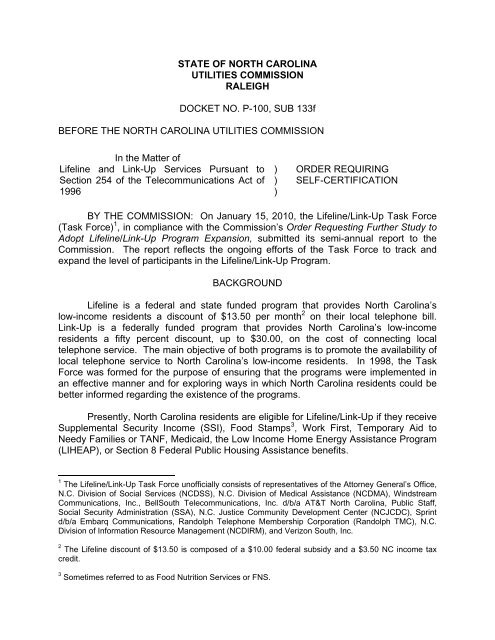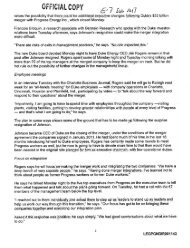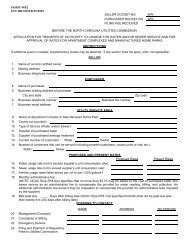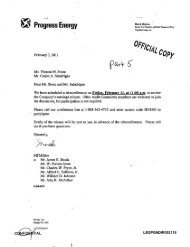STATE OF NORTH CAROLINA UTILITIES COMMISSION ... - NCUC
STATE OF NORTH CAROLINA UTILITIES COMMISSION ... - NCUC
STATE OF NORTH CAROLINA UTILITIES COMMISSION ... - NCUC
Create successful ePaper yourself
Turn your PDF publications into a flip-book with our unique Google optimized e-Paper software.
<strong>STATE</strong> <strong>OF</strong> <strong>NORTH</strong> <strong>CAROLINA</strong><br />
<strong>UTILITIES</strong> <strong>COMMISSION</strong><br />
RALEIGH<br />
DOCKET NO. P-100, SUB 133f<br />
BEFORE THE <strong>NORTH</strong> <strong>CAROLINA</strong> <strong>UTILITIES</strong> <strong>COMMISSION</strong><br />
In the Matter of<br />
Lifeline and Link-Up Services Pursuant to<br />
Section 254 of the Telecommunications Act of<br />
1996<br />
)<br />
)<br />
)<br />
ORDER REQUIRING<br />
SELF-CERTIFICATION<br />
BY THE <strong>COMMISSION</strong>: On January 15, 2010, the Lifeline/Link-Up Task Force<br />
(Task Force) 1 , in compliance with the Commission’s Order Requesting Further Study to<br />
Adopt Lifeline/Link-Up Program Expansion, submitted its semi-annual report to the<br />
Commission. The report reflects the ongoing efforts of the Task Force to track and<br />
expand the level of participants in the Lifeline/Link-Up Program.<br />
BACKGROUND<br />
Lifeline is a federal and state funded program that provides North Carolina’s<br />
low-income residents a discount of $13.50 per month 2 on their local telephone bill.<br />
Link-Up is a federally funded program that provides North Carolina’s low-income<br />
residents a fifty percent discount, up to $30.00, on the cost of connecting local<br />
telephone service. The main objective of both programs is to promote the availability of<br />
local telephone service to North Carolina’s low-income residents. In 1998, the Task<br />
Force was formed for the purpose of ensuring that the programs were implemented in<br />
an effective manner and for exploring ways in which North Carolina residents could be<br />
better informed regarding the existence of the programs.<br />
Presently, North Carolina residents are eligible for Lifeline/Link-Up if they receive<br />
Supplemental Security Income (SSI), Food Stamps 3 , Work First, Temporary Aid to<br />
Needy Families or TANF, Medicaid, the Low Income Home Energy Assistance Program<br />
(LIHEAP), or Section 8 Federal Public Housing Assistance benefits.<br />
1 The Lifeline/Link-Up Task Force unofficially consists of representatives of the Attorney General’s Office,<br />
N.C. Division of Social Services (NCDSS), N.C. Division of Medical Assistance (NCDMA), Windstream<br />
Communications, Inc., BellSouth Telecommunications, Inc. d/b/a AT&T North Carolina, Public Staff,<br />
Social Security Administration (SSA), N.C. Justice Community Development Center (NCJCDC), Sprint<br />
d/b/a Embarq Communications, Randolph Telephone Membership Corporation (Randolph TMC), N.C.<br />
Division of Information Resource Management (NCDIRM), and Verizon South, Inc.<br />
2 The Lifeline discount of $13.50 is composed of a $10.00 federal subsidy and a $3.50 NC income tax<br />
credit.<br />
3 Sometimes referred to as Food Nutrition Services or FNS.
The Task Force has also has been active in increasing awareness of and<br />
participation in Lifeline/Link-Up through a variety of means. In an Order issued on<br />
April 10, 2008, the Commission approved a self-certification pilot program to be<br />
conducted by AT&T.<br />
TASK FORCE ANALYSIS AND RECOMMENDATIONS<br />
On January 15, 2010, the Task Force filed its annual report with<br />
recommendations. The Task Force reported that, based on reports filed by local<br />
telephone providers as of December 31, 2009, there were 155,585 households<br />
receiving Lifeline benefits. Also, during the period of July 1, 2009 through December<br />
31, 2009, there were 46,648 households that received Link-Up discounts for the cost of<br />
connecting telephone service. 4 In the June 2009 Task Force report, there were 141,112<br />
Lifeline recipients and 16,069 households that received Link-Up discounts.<br />
The Task Force also reported on AT&T’s self-certification pilot project, as well<br />
efforts to implement a streamlined enrollment procedure for recipients of Food Stamps.<br />
The Task Force recommended that the Commission adopt self-certification as the<br />
means by which all jurisdictional local providers enroll participants in the Lifeline/Link-Up<br />
program. Additionally, the Task Force reported on its efforts to increase awareness of<br />
with Lifeline/Link-Up benefits through the placement of posters in county Department of<br />
Social Services (DSS) offices throughout the state.<br />
The Task Force recounted that, following the April 10, 2008 Order, which<br />
approved the addition of federal public housing, AT&T had begun the self-certification<br />
pilot program which had been earlier approved by the Commission. 5 The Task Force<br />
stated that customers who contacted AT&T for information on the Lifeline/Link-Up<br />
program were sent the self-certification form, and, upon receipt of the completed and<br />
signed form, the customer was added as a Lifeline recipient.<br />
The Task Force noted that AT&T filed a report with the Commission on<br />
June, 5, 2009, in which AT&T reporting that during the first year of the pilot program,<br />
approximately 99% of its new Lifeline/Link-Up applicants used the self-certification form.<br />
Also, the monthly average of AT&T Lifeline applicants increased by about 20% during<br />
the pilot program and the average of Link-Up applicants increased approximately 40%.<br />
AT&T did not report any increase in instances of fraud or misrepresentation by<br />
Lifeline/Link-Up applicants.<br />
Furthermore, AT&T adopted an audit process in which AT&T periodically would<br />
send letters and self-certification forms to a representative sample of Lifeline<br />
participants to verify continued eligibility to receive Lifeline benefits. If the<br />
4 Statistics for the six-month period ended December 31, 2009, had not been filed by all local telephone<br />
providers at the time of this report.<br />
5 Order Concerning Task Force Report and Authorizing Pilot Program, Docket No. P-100, Sub 133f,<br />
(September 5, 2007).<br />
2
self-certification form was not returned to AT&T within 60 days, or if it is returned stating<br />
that the consumer was no longer eligible for a qualifying program, then AT&T removed<br />
the consumer from participation in the Lifeline program. The Task Force stated that this<br />
review procedure is acceptable under the Federal Communications Commission’s<br />
(FCC’s) guidelines and AT&T found it to work well.<br />
AT&T reported that it found the self-certification process to be more cost effective<br />
than processing applications under the existing system. AT&T uses self-certification in<br />
all of its southeastern states, and it said that its positive findings were consistent with its<br />
experience in the other southeastern states.<br />
The Task Force formed a subcommittee to study whether the self certification<br />
procedure should be adopted as the sole or primary Lifeline/Link-Up application<br />
procedure to be used by all local service providers. The subcommittee reported to the<br />
Task Force’s meeting on December 10, 2009, presenting the following observations:<br />
• The Task Force examined whether the costs impact to smaller service<br />
providers for administrative changes and employee retraining would be<br />
outweighed by the operational savings going forward. The Task Force<br />
concluded that there were long-term benefits in staff time saved by the<br />
streamlined application and review procedure. Accordingly, the Task Force<br />
concluded that such long-term benefits would outweigh the costs incurred by<br />
smaller providers.<br />
• The Task Force addressed whether a standardized self-certification form<br />
should be used by all the service providers. A draft form was developed and<br />
submitted with the Task Force’s semi-annual report. The Task Force stated<br />
that several changes were made to the form used by AT&T to include a list of<br />
the names and addresses of all non-cellular Lifeline/Link-Up telephone<br />
providers on the back of the form, adding a phrase explaining that only one<br />
Lifeline benefit is available per household, and adding the sentence that long<br />
distance call blocking is available to Lifeline recipients at no charge upon<br />
request.<br />
• The Task Force reported that it discussed whether potential applicants would<br />
have enough information about Lifeline/Link-Up and the self-certification<br />
procedure to enable them to file a proper application with their telephone<br />
service provider. The Task Force concluded that the adoption of the<br />
self-certification procedure for Lifeline-Link-Up benefits should have no impact<br />
on information availability to the public. The Task Force pointed out that there<br />
would be no change in the program information provided by DSS<br />
caseworkers once an applicant for Medicaid, Food Stamps or other qualifying<br />
benefits is found eligible. The local telephone service providers and the Task<br />
Force will continue publicizing Lifeline/Link-Up in the same manner. The only<br />
change will be the use of self-certification to enroll in the program.<br />
• The Task Force recommended that if self-certification is adopted as the sole<br />
procedure for enrolling Lifeline/Link-Up participants, the Commission should<br />
also approve the use of the above described self-certification eligibility review<br />
3
process by the local telephone service providers. Using self-certification and<br />
the current system for enrolling applicants would be confusing and a waste of<br />
resources. Accordingly, the Task Force stated that it unanimously<br />
recommended that the Commission adopt the self-certification procedure as<br />
the sole method to enroll consumers in the Lifeline/Link-Up program and<br />
approve the use of the above described self-certification eligibility review<br />
process by all local telephone service providers.<br />
The Task Force noted that the Commission has had an ongoing interest in<br />
increasing participation among eligible consumers to receive Lifeline-Link-Up benefits.<br />
To do so, the Commission earlier approved a self-certification pilot project, which was<br />
undertaken by AT&T and subsequently reported as successful, as well as cost-justified.<br />
The Task Force reported that after the successful completion of the self-certification<br />
pilot program by AT&T, it formed a subcommittee to investigate the adoption of<br />
self-certification for use by all local service providers. There were two concerns of<br />
whether to adopt a self-certification procedure for clients to receive Lifeline/Link-Up<br />
benefits: (1) the cost to implement a self-certification program, especially among the<br />
smaller local telephone service providers; and, (2) the adoption of a standard<br />
procedure, to include a self-certification form and an on-going account verification<br />
procedure.<br />
The Task Force stated that the cost to implement the self-certification procedure<br />
to eligible consumers to receive Lifeline/Link-Up benefits was reasonable in that gains<br />
from programmatic operational efficiencies would outweigh the on-going operational<br />
expenses to support the self-certification procedure, even for the smaller local<br />
telephone service providers. The Task Force also believed that there were long-term<br />
benefits in staff time saved by the streamlined application and review procedure.<br />
The Task Force included a recommended self-certification form to be used for<br />
the program by all local service providers. The proposed self-certification form, a<br />
modified form used in the AT&T pilot program, would also include a listing of all wire line<br />
local telephone service providers who provide Lifeline/Link-Up benefits. Furthermore,<br />
the Task Force stated that the Commission should adopt the self-certification procedure<br />
as the sole method to enroll consumers in the Lifeline/Link-Up program and approve the<br />
use of the above described self-certification eligibility review process by all local<br />
telephone service providers. The verification of eligibility for recipients to continue<br />
receiving Lifeline discounts would be adopted from the AT&T pilot, in which, AT&T<br />
periodically would send letters and self-certification forms to a representative sample of<br />
Lifeline participants to verify continued eligibility to receive Lifeline benefits. If the<br />
self-certification form was not returned to AT&T within 60 days, or if it is returned stating<br />
that the consumer was no longer eligible for a qualifying program, then AT&T removed<br />
the consumer from participation in the Lifeline program.<br />
In addition, the Task Force believed that there should be no change in the<br />
program information provided by DSS caseworkers once an applicant for Medicaid,<br />
FNS or other qualifying benefits is found eligible. The local telephone service providers<br />
4
and the Task Force will continue publicizing Lifeline/Link-Up in the same manner, with<br />
the only change being how consumers are enrolled in the program.<br />
WHEREUPON, the Commission reached the following<br />
CONCLUSIONS<br />
After careful consideration, the Commission concludes that good cause exists to<br />
modify the certification process for eligibility for the Lifeline/Link-Up program so as to<br />
allow self-certification by recipients. 6 The Commission believes that, based on the<br />
representations of the Task Force, the AT&T self-certification experiment has been a<br />
success, combining greater efficiency with appropriate protections against fraud, and<br />
that, therefore, the same self-certification process should be generally adopted as part<br />
of the Lifeline/Link-Up enrollment process. The Commission commends the work of the<br />
Task Force, AT&T, and the various social service agencies for their contributions to<br />
improving delivery of the Lifeline/Link-Up program to qualifying recipients. The<br />
Commission urges the Task Force to continue with its efforts to improve the<br />
Lifeline/Link-Up program.<br />
IT IS, THERFORE, ORDERED as follows:<br />
1. That self-certification by clients of eligible programs for Lifeline/Link-Up be<br />
authorized as the sole procedure for enrollment in Lifeline/Link-Up.<br />
2. That the self-certification form attached as Appendix A be authorized for<br />
use by clients of eligible programs for Lifeline/Link-Up. The listing of eligible telephone<br />
companies on that form may be modified from time to time to accurately reflect the<br />
companies’ participation.<br />
3. That the eligibility review audit process utilized by AT&T in the<br />
self-certification pilot program be made permanent for AT&T and be extended to and<br />
required of all other telephone companies participating in the provision of the<br />
Lifeline/Link-Up program.<br />
6 This includes modification of Rule R9-6(d) concerning verification by the appropriate social service<br />
agency.<br />
5
4. That Rule R9-6( (d), regarding Link-Up<br />
verification be rewritten as follows:<br />
“(d) Verification – The method for verification of the eligibility<br />
criteria set forth in (c)(2)<br />
shall be self-certification by the recipients<br />
of the eligible programs.”<br />
5. That the Task Force collect the same type of statistical dataa it collected for<br />
the AT& &T Pilot Program from the various<br />
participating telephone companies and submit<br />
an analysis regarding same with the Task Force’s December<br />
31, 2010, Annual Report,<br />
together<br />
with any recommend<br />
dations the Task Force<br />
believes are neededd to improve<br />
the<br />
sign-up and verification process.<br />
IT IS, THEREFORE, SO<br />
ORDERED.<br />
ISSUED BY ORDER <strong>OF</strong><br />
THE <strong>COMMISSION</strong>.<br />
This the _2 nd<br />
day of _March, 2010.<br />
<strong>NORTH</strong> <strong>CAROLINA</strong> <strong>UTILITIES</strong> <strong>COMMISSION</strong><br />
Gail L. Mount, Deputy Clerk<br />
mr030210.01<br />
6
APPENDIX A<br />
PAGE 1 <strong>OF</strong> 2<br />
<strong>NORTH</strong> <strong>CAROLINA</strong> LIFELINE/LINK-UP<br />
SELF-CERTIFICATION LETTER<br />
Billing Name __________________________________________________<br />
Service Address ________________________________________________<br />
City State Zip _________________________________________________<br />
Telephone Number: ______________________________________________<br />
I hereby certify that I participate in the following public assistance program(s):<br />
( ) Medicaid<br />
( ) Low Income Home Energy Assistance Program (LIHEAP)<br />
( ) Federal Public Housing Or Section 8 Assistance (FPHA)<br />
( ) Supplemental Security Income (SSI)<br />
( ) Food & Nutrition Services (Food Stamps)<br />
( ) Temporary Aid to Needy Families or Work First<br />
Lifeline provides a monthly discount on your local telephone bill. If you do not have a<br />
telephone, Link-Up provides a 50% discount, up to $30, on the cost of connecting local<br />
telephone service. If you receive any one of the public benefits listed above and the<br />
telephone service is in your name, then you can receive Lifeline/Link-Up benefits. Only<br />
one Lifeline benefit is available per household. Long distance call blocking is available<br />
to Lifeline recipients at no charge upon request.<br />
I certify, under penalty of perjury, that I am a current recipient of the above program(s)<br />
and will notify my telecommunications service provider when I am no longer<br />
participating in at least one of the above-designated program(s). I authorize my<br />
telecommunications service provider or its duly appointed representative to access any<br />
records required to verify these statements to confirm my continued participation in the<br />
above program(s). I authorize representatives of the above program(s) to discuss<br />
with/or provide copies to my telecommunications service provider, if requested by the<br />
company to verify my participation in the above program(s) and my eligibility for<br />
Lifeline/Link-Up.<br />
______________________________________<br />
Applicant’s signature<br />
__________________<br />
Date<br />
Please mail completed self-certification form to your telecommunications service<br />
provider at the address shown on the back of this form
APPENDIX A<br />
PAGE 2 <strong>OF</strong> 2<br />
Affordable Phone Services, Inc<br />
2855 SE 58 th Ave<br />
Ocala, FL 34480<br />
Aspire Telecom, Inc<br />
P.O. Box 2174<br />
Asheville, NC 28802<br />
Atlantic Telephone Membership Corp<br />
P.O. box 3198<br />
Shallotte, NC 28459<br />
AT&T RSC<br />
304 Pine Avenue, 4 th Floor<br />
Albany, GA 31702<br />
Barnardsville Telephone Company<br />
P.O. Box 22995<br />
Knoxville, TN 37933-0995<br />
BLC Management LLC<br />
11121 Highway 70, Suite 202<br />
Arlington, TN 38002<br />
Budget Prepay, Inc, d/b/a NewPhone<br />
1325 Barksdale Blvd.<br />
Bossier City, LA 71111<br />
dPi-Teleconnect, L.L.C<br />
2997 LBJ Freeway<br />
Suite 225<br />
Dallas, TX 75234<br />
Lexcom Telephone Company<br />
200 North State Street<br />
P.O. Box 808<br />
Lexington, NC 27293-0808<br />
Mebtel, Inc<br />
C/O Century Tel<br />
19812 Underwood Rd<br />
Foley, AL 36535<br />
Pineville Telephone Company<br />
P.O. Box 249<br />
Pineville, NC 28134<br />
Saluda Mtn Telephone Company<br />
P.O. Box 22995<br />
Knoxville, TN 37933-0995<br />
Star Telephone Membership<br />
Corporation<br />
P.O. Box 348<br />
Clinton, NC 28329<br />
Tri-County Telephone Membership<br />
Corporation<br />
P.O. Box 520<br />
Belhaven, NC 27810<br />
Windstream<br />
ATTN : Support Services – Lifeline<br />
1720 Galleria Boulevard<br />
Charlotte, NC 28270<br />
CenturyLink<br />
Attn: Lifeline<br />
P. O. Box 4918<br />
Monroe, LA 71211<br />
Ellerbe Telephone Company<br />
P.O. Box 220<br />
Ellerbe, NC 28338-0220<br />
Lifeconnex Telecom, LLC f/k/a Swiftel,<br />
LLC<br />
811 West Garden St<br />
Pensacola, FL 32507-7475<br />
Nexus Communications, Inc<br />
C/O Early, Lennon, Crocker<br />
900 Comerica Bldg<br />
Kalamazoo, MI 49007-4752<br />
Randolph Telephone Company<br />
3733 Old Cox Rd<br />
Asheboro, NC 27205<br />
Service Telephone Company<br />
P.O. Box 22995<br />
Knoxville, TN 37933-0995<br />
Surry Telephone Membership Corporation<br />
P.O. Box 385<br />
Dobson, NC 27017-0385<br />
Verizon Lifeline Services - NC<br />
Attn: Lifeline Supervisor<br />
P. O. Box 4500<br />
Hayden, ID 83835-4500<br />
Yadkin Valley Telephone Membership<br />
Corporation<br />
P.O. Box 368<br />
Yadkinville, NC 27055<br />
Citizens Telephone Company<br />
P.O. Box 470<br />
Rock Hill, SC 29730<br />
Image Access, Inc<br />
5555 Hilton Avenue, #415<br />
Baton Rouge, LA 70808<br />
MCImetro Access Trans<br />
5055 North Point Parkway<br />
2 nd Floor<br />
Alpharette, GA 30022<br />
North State Telephone Company<br />
P.O. Box 2326<br />
High Point, NC 27261<br />
Randolph Telephone Membership<br />
Corporation<br />
3733 Old Cox Road<br />
Asheboro, NC 27205<br />
Skyline Telephone Membership<br />
Corporation<br />
P.O. Box 759<br />
West Jefferson, NC 28694<br />
Tennessee Telephone Services, LLC<br />
P.O. Box 1995<br />
Dickson, TN 37056<br />
Wilkes Telephone Membership<br />
Corporation<br />
1400 River Street<br />
Wilkesboro, NC 28697





